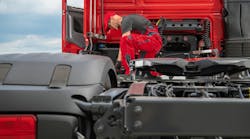When you grocery shop, you plainly see the price of items. And you feel certain those prices won’t change before you get to the register.
What if that wasn’t the case? What if you went to the store and tossed a bag of chips and a gallon of milk into your basket, only to discover that they rang up at twice the price you expected? It would most likely be your last trip to that store, especially if your budget was tight.
Uncertainty when it comes to costs always feels unsettling, whether you’re buying bread or buses.
A look ahead
At this year’s NTEA Work Truck Show in Indianapolis, one trend that emerged is the continued worry for fleet decision-makers about the unpredictability of diesel prices. The diesel landscape is in flux: In January 2020 for instance, the marine industry will be forced to reduce the sulfur content of the diesel fuel ships consume. At that point, ocean-going vessels will draw from the same supply of ultra-low sulfur diesel (ULSD) that our on-road fleets use. The Energy Information Administration’s short-term energy outlook warns this change will put pressure on diesel costs and add more uncertainty to the diesel fuel market.
These uncertainties underscore the importance of relying on a domestically produced fuel. More than 90% of the propane autogas supply in the U.S. is produced within our country. An additional 7% comes from Canada. Almost 75% of the propane used nationwide comes from natural gas refining, and the remaining from petroleum refining. Our nation has so much propane that we are the world’s largest exporter, exporting 905,000 barrels a day in 2017. The abundance of propane means price stability.
Fleet buy-in
At the Work Truck Show, it was clear the message about propane autogas vehicles’ reduced complexity, decreased emissions and lower total cost of ownership is resonating with current and future customers.
By choosing American-made propane autogas, you can avoid the uncertainty of diesel pricing. And your propane fleet vehicles will be helping our nation’s energy security goals, reducing harmful emissions and reaping the benefits of lowered cost per mile.



